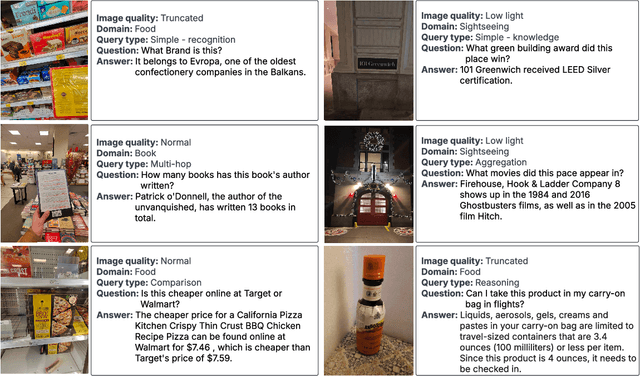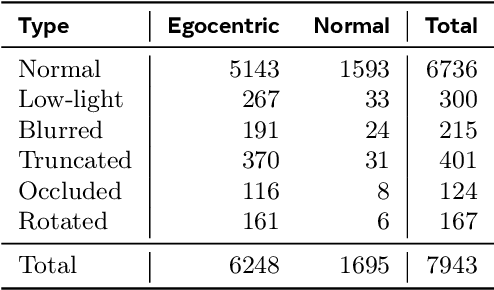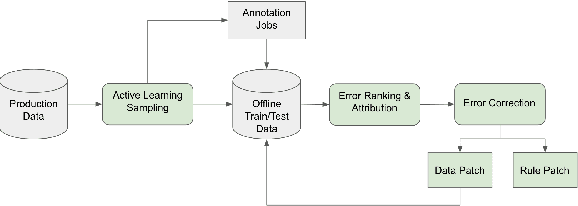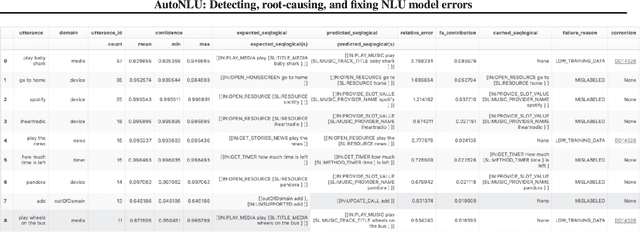Nicolas Scheffer
CRAG-MM: Multi-modal Multi-turn Comprehensive RAG Benchmark
Oct 30, 2025



Abstract:Wearable devices such as smart glasses are transforming the way people interact with their surroundings, enabling users to seek information regarding entities in their view. Multi-Modal Retrieval-Augmented Generation (MM-RAG) plays a key role in supporting such questions, yet there is still no comprehensive benchmark for this task, especially regarding wearables scenarios. To fill this gap, we present CRAG-MM -- a Comprehensive RAG benchmark for Multi-modal Multi-turn conversations. CRAG-MM contains a diverse set of 6.5K (image, question, answer) triplets and 2K visual-based multi-turn conversations across 13 domains, including 6.2K egocentric images designed to mimic captures from wearable devices. We carefully constructed the questions to reflect real-world scenarios and challenges, including five types of image-quality issues, six question types, varying entity popularity, differing information dynamism, and different conversation turns. We design three tasks: single-source augmentation, multi-source augmentation, and multi-turn conversations -- each paired with an associated retrieval corpus and APIs for both image-KG retrieval and webpage retrieval. Our evaluation shows that straightforward RAG approaches achieve only 32% and 43% truthfulness on CRAG-MM single- and multi-turn QA, respectively, whereas state-of-the-art industry solutions have similar quality (32%/45%), underscoring ample room for improvement. The benchmark has hosted KDD Cup 2025, attracting about 1K participants and 5K submissions, with winning solutions improving baseline performance by 28%, highlighting its early impact on advancing the field.
CRAG -- Comprehensive RAG Benchmark
Jun 07, 2024



Abstract:Retrieval-Augmented Generation (RAG) has recently emerged as a promising solution to alleviate Large Language Model (LLM)'s deficiency in lack of knowledge. Existing RAG datasets, however, do not adequately represent the diverse and dynamic nature of real-world Question Answering (QA) tasks. To bridge this gap, we introduce the Comprehensive RAG Benchmark (CRAG), a factual question answering benchmark of 4,409 question-answer pairs and mock APIs to simulate web and Knowledge Graph (KG) search. CRAG is designed to encapsulate a diverse array of questions across five domains and eight question categories, reflecting varied entity popularity from popular to long-tail, and temporal dynamisms ranging from years to seconds. Our evaluation on this benchmark highlights the gap to fully trustworthy QA. Whereas most advanced LLMs achieve <=34% accuracy on CRAG, adding RAG in a straightforward manner improves the accuracy only to 44%. State-of-the-art industry RAG solutions only answer 63% questions without any hallucination. CRAG also reveals much lower accuracy in answering questions regarding facts with higher dynamism, lower popularity, or higher complexity, suggesting future research directions. The CRAG benchmark laid the groundwork for a KDD Cup 2024 challenge, attracting thousands of participants and submissions within the first 50 days of the competition. We commit to maintaining CRAG to serve research communities in advancing RAG solutions and general QA solutions.
AutoNLU: Detecting, root-causing, and fixing NLU model errors
Oct 12, 2021



Abstract:Improving the quality of Natural Language Understanding (NLU) models, and more specifically, task-oriented semantic parsing models, in production is a cumbersome task. In this work, we present a system called AutoNLU, which we designed to scale the NLU quality improvement process. It adds automation to three key steps: detection, attribution, and correction of model errors, i.e., bugs. We detected four times more failed tasks than with random sampling, finding that even a simple active learning sampling method on an uncalibrated model is surprisingly effective for this purpose. The AutoNLU tool empowered linguists to fix ten times more semantic parsing bugs than with prior manual processes, auto-correcting 65% of all identified bugs.
 Add to Chrome
Add to Chrome Add to Firefox
Add to Firefox Add to Edge
Add to Edge